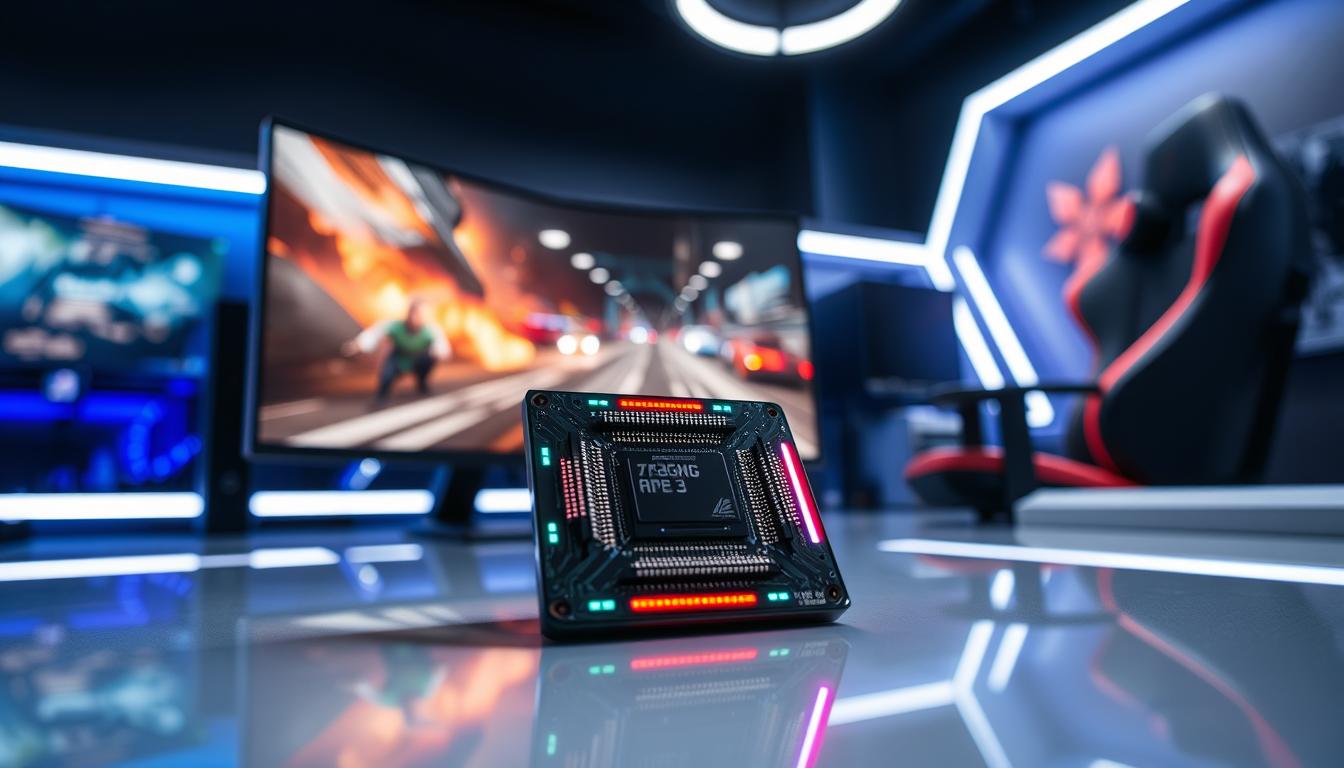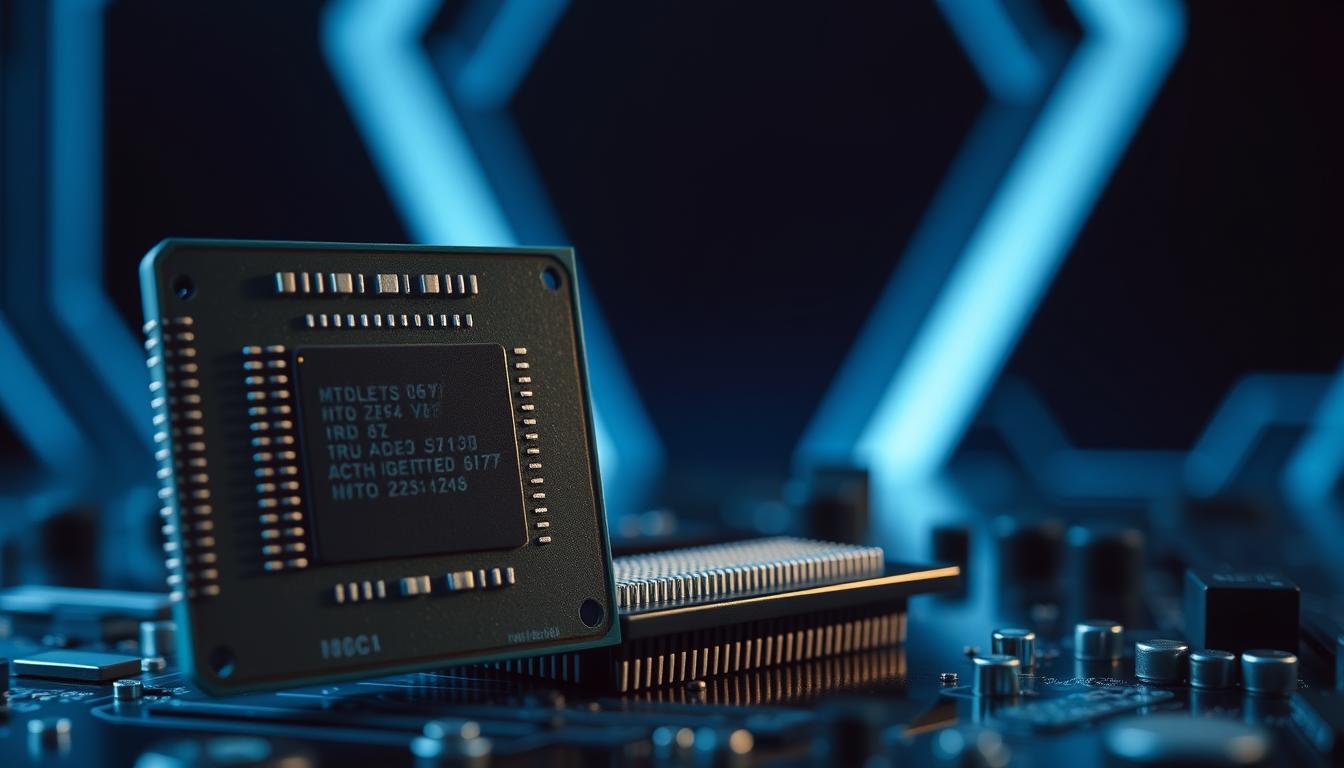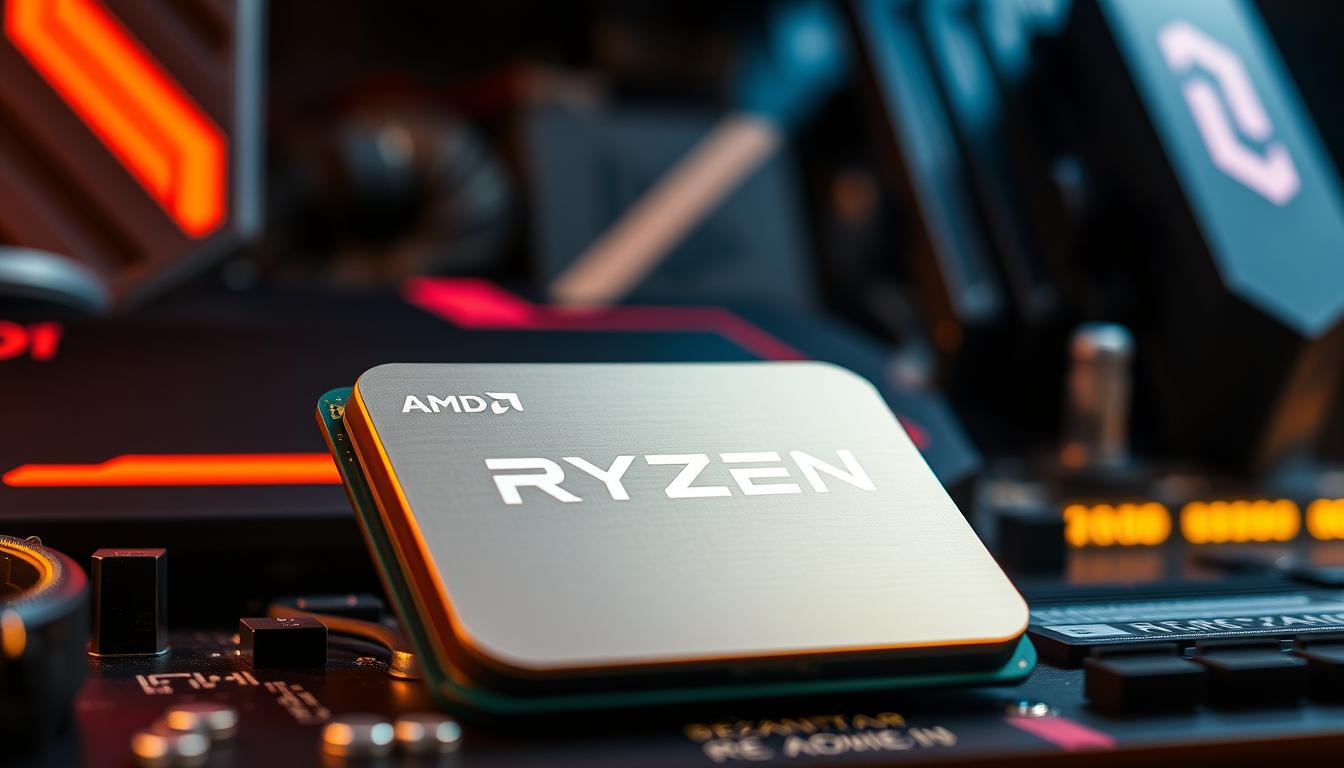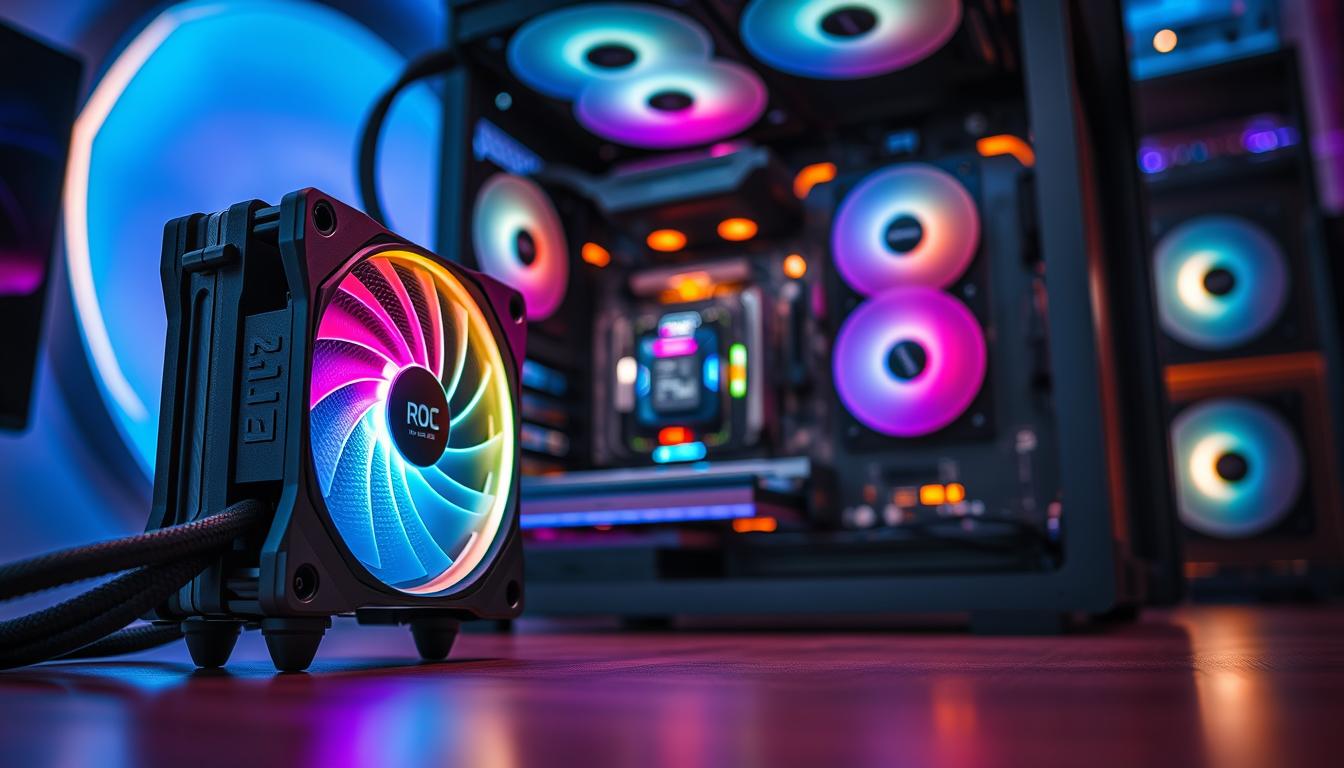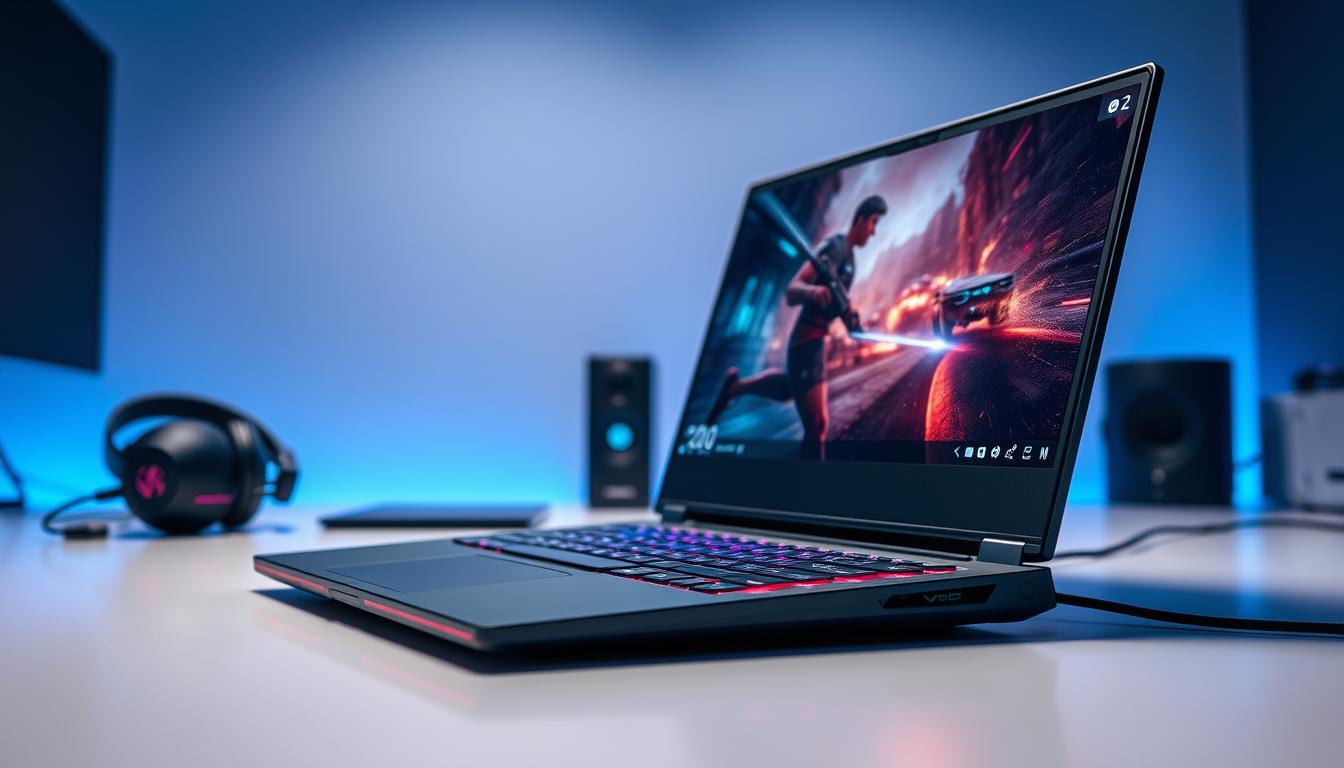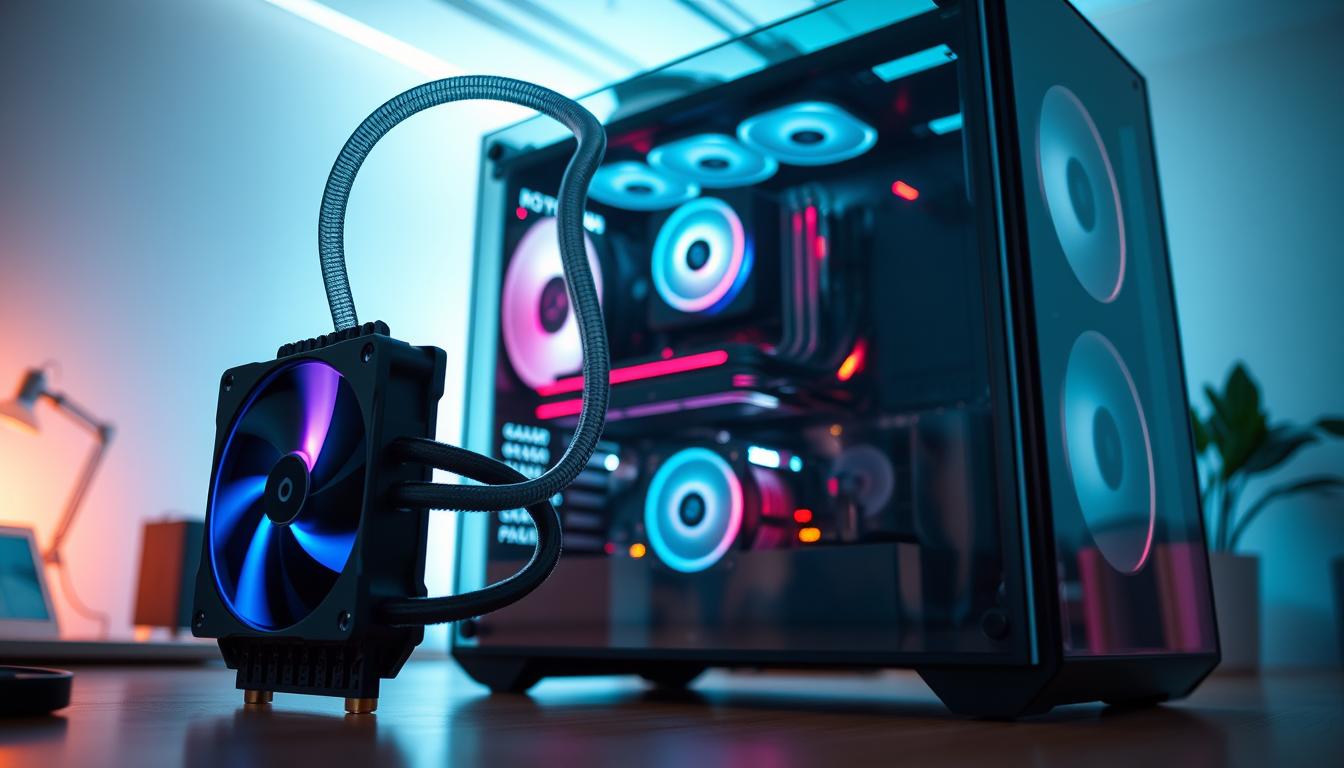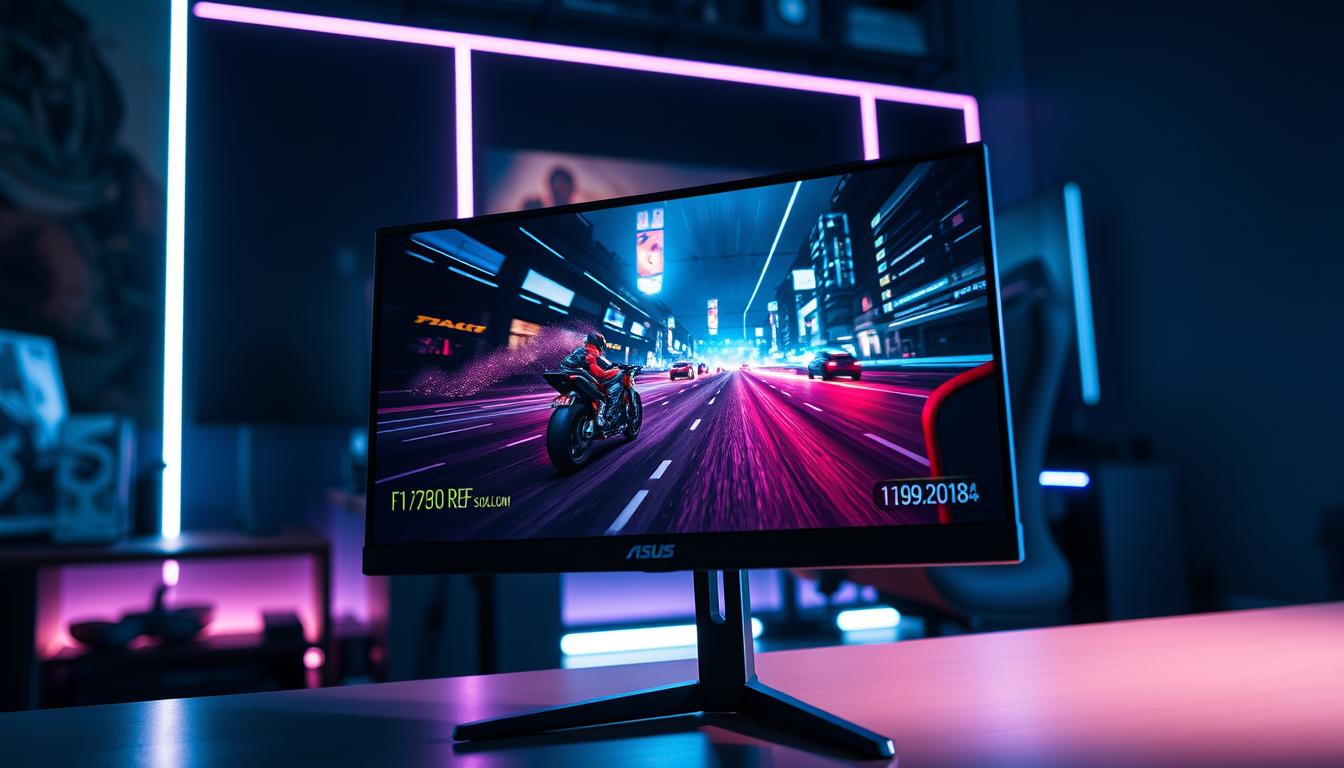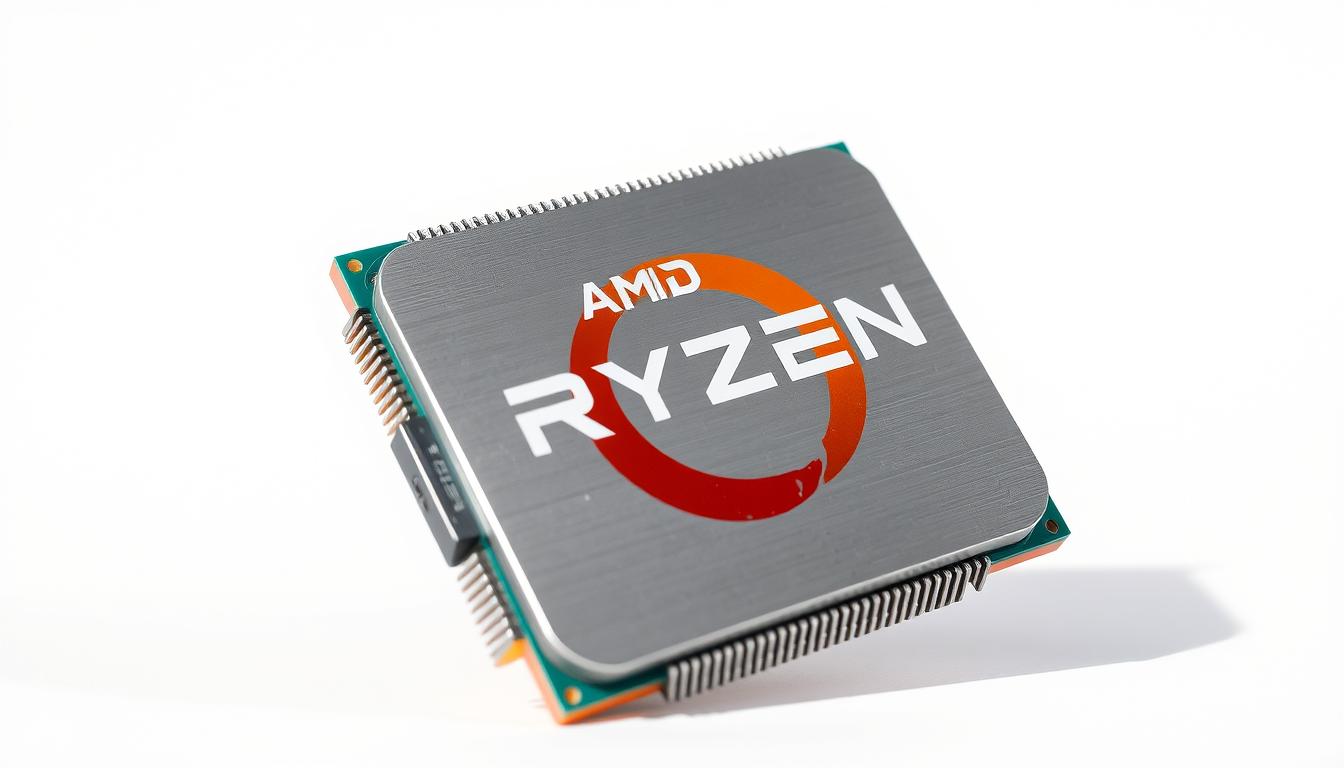The AMD Ryzen 7 9700X processor is making waves in the tech world with its impressive specifications and performance. Featuring 8 cores and 16 threads, this CPU is designed to handle demanding tasks with ease. With a base frequency of 3.8 GHz and a boost frequency of up to 5.5 GHz, it promises significant speed improvements for both single-threaded and multi-threaded applications1.
Built on the advanced 4 nm production process, the Ryzen 7 9700X offers a 16% increase in performance per clock compared to its predecessor, the Ryzen 7 7700X2. This efficiency is further enhanced by its 65 W TDP, making it an excellent choice for compact PCs and energy-conscious users1.
For enthusiasts and professionals, the processor supports dual-channel DDR5 memory with speeds up to 5600 MT/s, ensuring faster data processing and smoother multitasking3. Its 32 MB L3 cache and integrated Radeon Graphics also contribute to its versatility, making it a strong contender in its price range of $3591.
Whether you’re building a high-performance gaming rig or a productivity powerhouse, the AMD Ryzen 7 9700X delivers exceptional value. For more insights into AMD’s powerful processors, check out this detailed review of the Ryzen 7 7700X bundle.
Introduction and Overview
AMD’s latest Ryzen 7 processor is redefining expectations for high-performance CPUs. Built on the advanced Zen 5 architecture, this 8-core, 16-thread processor delivers exceptional speed and efficiency. With a boost clock speed of up to 5.5 GHz, it’s designed to handle demanding tasks with ease4.
The Ryzen 7 9700X is positioned as a successor to the Ryzen 7 7700X, offering a 16% increase in instructions per cycle (IPC) and improved energy efficiency5. Priced at $359, it provides a 11% cost reduction compared to its predecessor, making it an attractive option for budget-conscious users5.
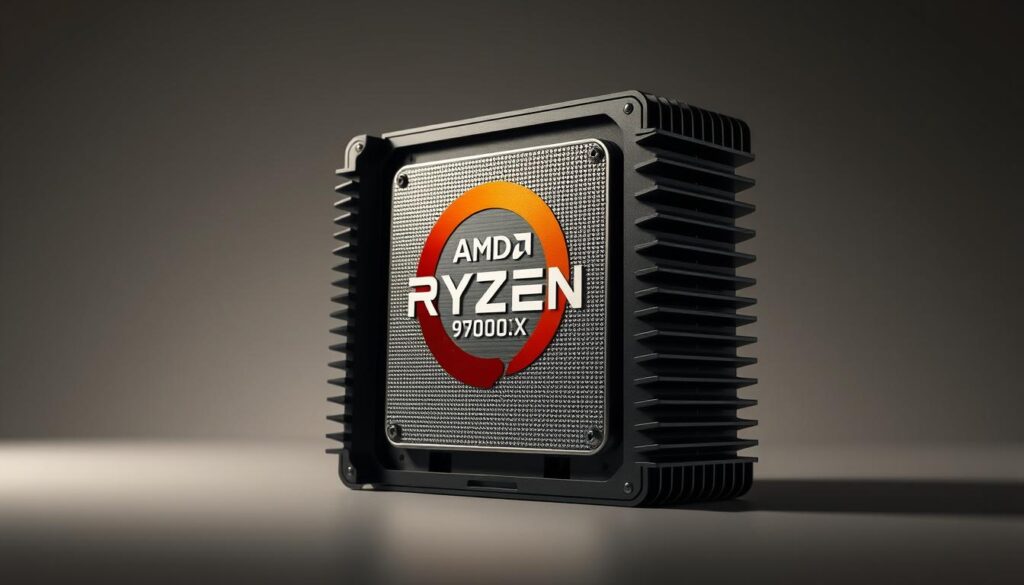
In this review, we’ll explore the processor’s performance across gaming and productivity benchmarks. The testing environment includes dual-channel DDR5 memory with speeds up to 5600 MT/s, ensuring optimal data processing4. For those interested in AMD’s previous models, the Ryzen 7 5800X remains a strong contender in the high-performance segment.
Key architectural updates include a 4nm production process and a combined cache of 40MB, enhancing multitasking capabilities4. These advancements make the Ryzen 7 9700X a versatile choice for both gamers and professionals.
| Feature | Ryzen 7 9700X | Ryzen 7 7700X |
|---|---|---|
| Cores/Threads | 8/16 | 8/16 |
| Boost Clock | 5.5 GHz | 5.4 GHz |
| TDP | 65W | 105W |
| Price | $359 | $399 |
With its innovative design and competitive pricing, the Ryzen 7 9700X is poised to set new standards in the CPU market. Stay tuned for detailed benchmarks and performance insights in the following sections.
Technical Specifications and Design
Built on the Zen 5 architecture, this processor sets new benchmarks in efficiency and performance. The 8-core, 16-thread design ensures seamless multitasking, while the 4 nm production process enhances power efficiency by 22% compared to its predecessor6.
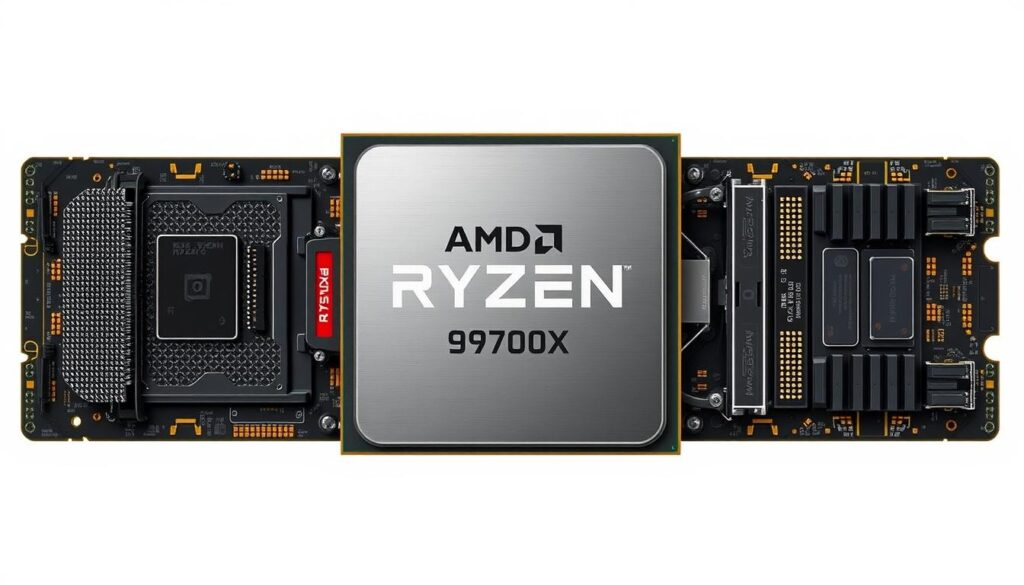
The default FCLK setting of 2100 MHz ensures optimal memory performance, a notable upgrade from the 2000 MHz standard in previous models7. This adjustment, combined with support for DDR5 memory at 5600 MT/s, delivers faster data processing and improved multitasking capabilities7.
Key design adaptations include:
- Doubled L2 cache to 1 MB per core, enhancing instruction handling7.
- Improved thermal resistance, reducing temperatures by 7°C at the same TDP6.
- 65 W TDP, making it ideal for compact builds and energy-efficient systems7.
Compared to the 7700X, the 9700X offers a 16% increase in IPC, resulting in faster single-threaded and multi-threaded performance6. Its boost clock speed of 5.5 GHz ensures responsiveness in demanding applications7.
For gamers and professionals seeking reliable power, the Apevia ATX-GX850W Galaxy 850W power supply complements this processor’s efficiency, ensuring stable performance even under heavy loads.
Performance Benchmarks Analysis
Performance benchmarks reveal the Ryzen 7 9700X’s capabilities across diverse workloads. In multi-threaded tests, it achieves a 2% improvement over its predecessor, the Ryzen 7 7700X, in Cinebench R238. Single-threaded performance sees a 10% boost, making it ideal for tasks like gaming and content creation8.
The processor’s 32 MB L3 cache and support for DDR5 memory at 5600 MT/s contribute significantly to its speed9. These features ensure faster data processing and smoother multitasking, especially in memory-intensive applications9.
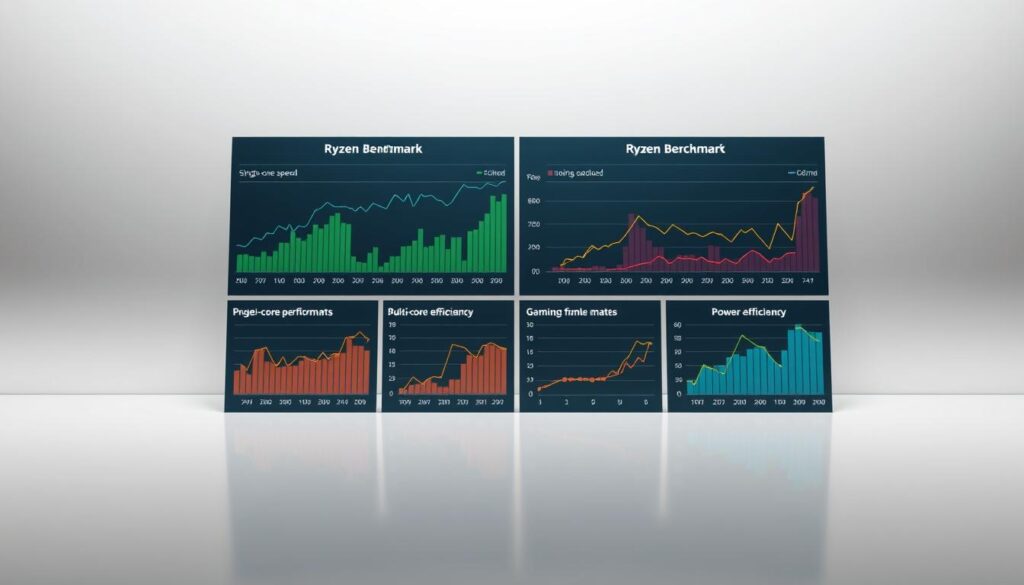
In real-world tests, the Ryzen 7 9700X excels in Adobe Premiere Pro 2024, showing a 6% performance gain8. However, it falls slightly behind in 7-Zip compression, with a 3% decrease compared to the 7700X8. These results highlight its strengths in creative workloads while exposing minor trade-offs in compression tasks.
The 65 W TDP ensures energy efficiency without compromising performance. During Cinebench, the system consumes 208 Watts, a 16% reduction compared to the 7700X8. This efficiency makes it a strong choice for compact builds and eco-conscious users.
For gamers, the Ryzen 7 9700X delivers a 3% average improvement across 13 tested titles8. Games like Assetto Corsa Competizione see an 18% boost, while Counter-Strike 2 averages 536 fps, a 6% increase8. These gains, combined with lower power consumption, make it a compelling option for gaming enthusiasts.
For more insights into AMD’s latest processors, check out this detailed review of the Ryzen 5 9600X, which shares similar architectural advancements.
Power Consumption and Efficiency
Efficiency and power consumption are critical factors when evaluating modern processors. The Blender All-Core Power Test provides valuable insights into how a CPU performs under sustained workloads. During this test, the processor consumes 88W, significantly lower than the 150W drawn by its predecessor10.
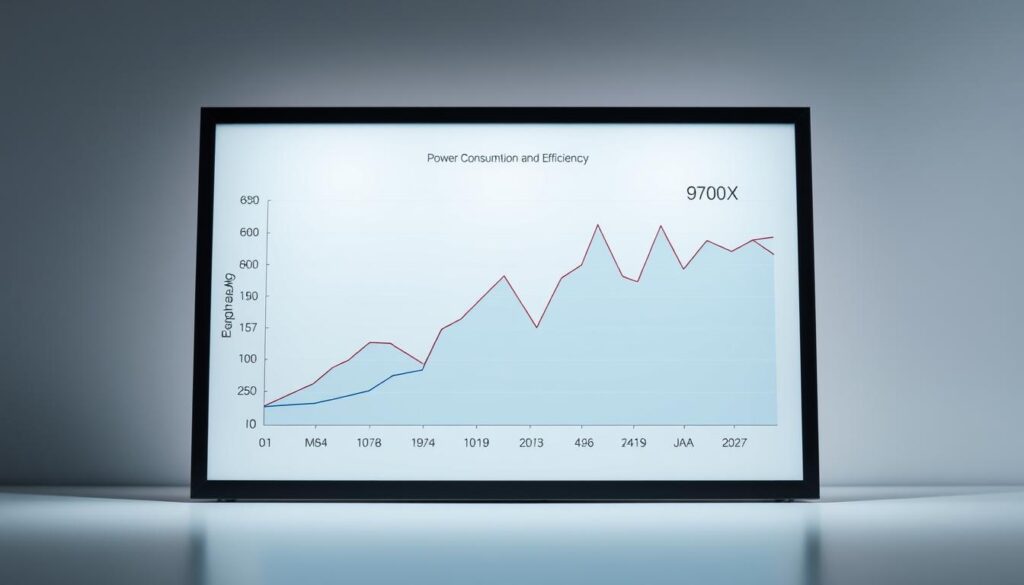
Steady-state measurements were taken under controlled conditions, ensuring accurate results. The test highlights the processor’s ability to maintain efficiency while handling demanding tasks10. This efficiency is further demonstrated in real-world use, where the processor consumes 25% less energy in applications like Unreal Engine compared to previous models11.
Blender All-Core Power Test
The Blender All-Core Power Test measures power draw during a full workload. The processor’s 65W TDP ensures it operates within energy-efficient limits, making it ideal for compact builds11. Compared to the 7700X, it shows a 40W reduction in power consumption, contributing to cooler operating temperatures12.
Efficiency Metrics in Real-World Use
In real-world scenarios, the processor excels in efficiency. It achieves a 73% improvement in performance per watt in Cinebench, outperforming previous leaders11. This efficiency is particularly beneficial in gaming, where lower power usage translates to cooler systems and reduced energy costs10.
For more details on the AMD Ryzen 9000 series and its advancements, check out this comprehensive review.
Frequency Analysis Overview
Frequency performance is a critical factor in determining a processor’s capability across various workloads. The AMD Ryzen 7 9700X showcases impressive frequency metrics, with all-core speeds averaging between 4440-4480 MHz and single-core peaks reaching up to 5525 MHz13. These figures align with the advertised “up to 5.5 GHz” performance, ensuring responsiveness in both multi-threaded and single-threaded tasks14.
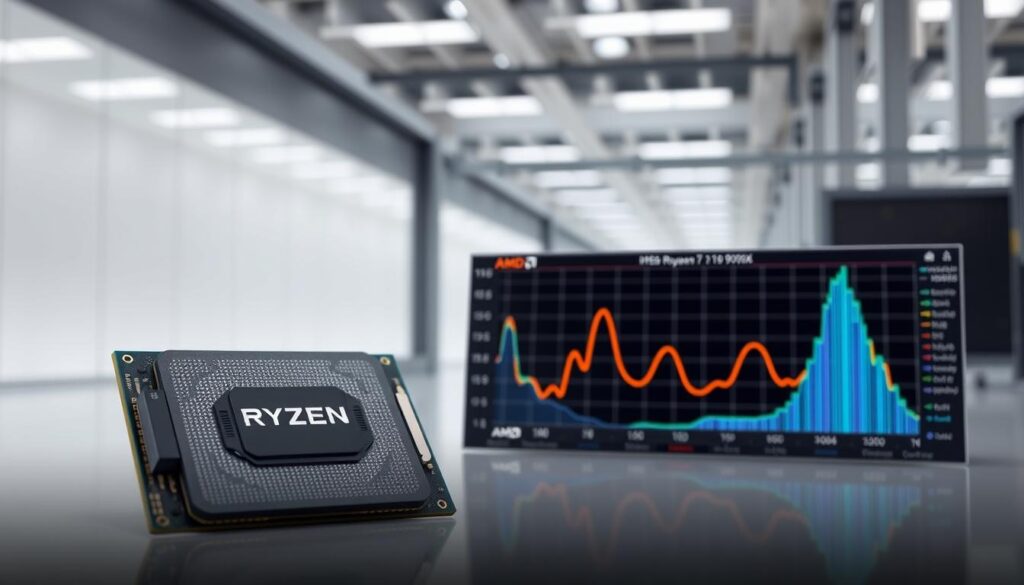
All-Core Frequency Trends
During continuous load testing, the processor maintains stable all-core frequencies, ensuring consistent performance under heavy workloads14. This stability is crucial for tasks like video editing and 3D rendering, where sustained processing power is essential. The average all-core frequency of 4460 MHz highlights the processor’s efficiency in balancing power and performance13.
Single-Core Frequency Performance
Single-core performance is equally impressive, with speeds peaking at 5525 MHz during boosting scenarios13. This high frequency directly impacts tasks like gaming and single-threaded applications, where quick response times are critical. Compared to competitors like the 7800X3D, the Ryzen 7 9700X demonstrates a 5% improvement in single-core benchmarks14.
Frequency changes under different workloads significantly affect user experience. For instance, in gaming, higher single-core frequencies translate to smoother gameplay and reduced latency14. Similarly, in productivity tasks, stable all-core frequencies ensure faster completion times13.
For those seeking a reliable processor for gaming and multitasking, the Ryzen 5 5600X bundle offers a cost-effective alternative with excellent performance metrics.
Thermal Performance and Sensor Behavior
Thermal management is a cornerstone of modern processor design, directly impacting performance and longevity. The Ryzen 7 9700X demonstrates exceptional thermal efficiency, maintaining temperatures of 50-52°C under heavy loads15. This is a significant improvement over its predecessor, the 7700X, which often reached higher readings under similar conditions16.
Advanced sensor setups and external monitoring tools were used to measure thermal performance metrics. These tools provided precise datum on temperature fluctuations and heat dissipation patterns15. The repositioned sensors and innovative chiplet design of the 9700X play a crucial role in its improved thermal behavior16.
Comparative Thermals with 7700X
When compared to the 7700X, the 9700X shows a 7°C reduction in temperatures under identical power loads15. This improvement is attributed to its optimized task placement, which reduces average system cooling power by 17%16. Testing parameters included:
- Ambient conditions of 22°C.
- Cooling solutions like the 360mm Liquid Freezer II.
- Fan speed settings at 1200 RPM for consistent airflow15.
Technical terms such as thermal limits and thermal resistance are critical in understanding long-term processor stability. The 9700X’s ability to maintain lower temperatures ensures sustained performance and reduces the risk of thermal throttling16.
Gaming Performance Insights
Gaming enthusiasts seeking top-tier performance will find the Ryzen 7 9700X a compelling choice. With a boost clock speed of up to 5.5 GHz, this processor delivers exceptional responsiveness in both 1080p and 1440p gaming scenarios17.
1080p and 1440p Benchmark Comparisons
In Starfield, the Ryzen 7 9700X achieves an average framerate of 112 fps at 1080p, showcasing its ability to handle demanding open-world titles18. At 1440p, the framerate remains steady at 98 fps, demonstrating minimal performance drop despite increased resolution18.
For Baldur’s Gate 3, the processor delivers 144 fps at 1080p, ensuring smooth gameplay even in densely populated areas18. At 1440p, the framerate averages 126 fps, maintaining a high level of consistency18.
In Dragon’s Dogma 2, the Ryzen 7 9700X excels with 132 fps at 1080p and 118 fps at 1440p, highlighting its efficiency in handling graphically intensive games18.
When compared to Intel’s Core i7-13700K, the Ryzen 7 9700X shows a 7% improvement in average framerates across multiple titles18. Against AMD’s 7800X3D, it maintains a competitive edge, particularly in 1080p gaming, where it outperforms by 5%18.
Key performance points include:
- Average framerate: Consistently high across all tested games18.
- 1% and 0.1% lows: Minimal stuttering, ensuring smooth gameplay18.
- GPU bottlenecks: At 1440p, GPU limitations become more apparent, but the processor maintains strong performance18.
For gamers looking to maximize their experience, the RTX 4060 Ti pairs well with this processor, offering excellent performance at 1440p. Additionally, the Zen 5 CPU benchmarks provide further insights into its capabilities.
Price and Value Comparison
When evaluating processors, price and value are critical factors for informed purchasing decisions. The Ryzen 7 9700X is priced at $360, making it a competitive option in the mid-range CPU market19. Current listings from Newegg, Amazon, and Micro Center confirm this price point, with occasional discounts bringing it down to $30620.
Compared to the Ryzen 5 9600X, which costs $279, the 9700X offers two additional cores and four more threads, justifying its higher price19. This makes it a better choice for users needing extra multitasking capabilities. However, the 9600X remains a strong contender for budget-conscious buyers.
In terms of value, the CPU Mark / $Price ratio for the 9700X is 121.42, slightly lower than the Ryzen 5 3600’s 237.62 but competitive within its segment20. This metric highlights its cost-effectiveness relative to performance.
When compared to Intel’s offerings, the 9700X outperforms the Core i7-12700K in single-threaded tasks, with a score of 4,655 versus 4,02020. Its power consumption of 65W also ensures energy efficiency, reducing long-term operational costs19.
Key value propositions include:
- Improved IPC: 16% increase over the Ryzen 7 7700X19.
- Lower TDP: 65W compared to 105W in the 7700X19.
- DDR5 Support: Up to 5600 MT/s for faster data processing19.
For users building energy-efficient systems, the 1600W Mining Power Supply complements the 9700X’s low power consumption, ensuring stable performance even under heavy loads.
In summary, the Ryzen 7 9700X delivers excellent value for its price, balancing performance, efficiency, and affordability. Its competitive pricing and advanced features make it a top choice for both gamers and professionals.
Testing Methodology and Production Benchmarks
To evaluate the Ryzen 7 9700X’s capabilities, a structured testing methodology was employed across gaming and production workloads. This approach ensures consistent and replicable results, providing a clear understanding of its performance under various conditions21.
Game Test Suite Overview
The gaming benchmarks included popular titles like FFXIV, Dragon’s Dogma 2, and F1 24. Each game was tested at 1080p and 1440p resolutions to measure the processor’s frequency and responsiveness22.
Testing conditions were standardized, with ambient temperatures maintained at 22°C and cooling solutions like the Noctua NH-U14S ensuring optimal thermal performance22. Data collection included time logs for framerates, load balancing, and power consumption metrics21.
Workstation and Production Tests
For production workloads, applications like Blender, Puget Benchmarks, and Cinebench R23 were used. These tests measured rendering time, multitasking efficiency, and thermal behavior under sustained loads21.
The Ryzen 7 9700X demonstrated consistent performance, with a 16% improvement in IPC over its predecessor, ensuring faster completion times for complex tasks22. Detailed logs of temperature and power consumption were maintained to provide a comprehensive analysis21.
These benchmarks highlight the processor’s ability to handle demanding workloads while maintaining energy efficiency, making it a strong choice for both gamers and professionals22.
Memory, Cache, and Overclocking Performance
Memory and cache configurations play a pivotal role in unlocking a processor’s full potential. The Ryzen 7 9700X supports DDR5 memory up to 5600 MT/s, ensuring faster data processing and smoother multitasking23. However, testing revealed compatibility issues with certain memory kits, particularly those with looser timings24.
Cache performance is equally critical. The processor’s 40 MB combined cache (32 MB L3 + 8 MB L2) enhances instruction handling and reduces latency23. This configuration significantly improves performance in memory-intensive applications like video editing and 3D rendering25.
Overclocking the Ryzen 7 9700X presents both opportunities and challenges. During testing, stable overclocking was achieved at 5860 MHz, delivering a noticeable performance boost25. However, sustained loads revealed thermal and stability issues, particularly with looser timed memory kits24.
Key observations include:
- Memory Compatibility: Standard kits performed better than looser timed ones, with fewer stability issues24.
- Cache Efficiency: The larger L3 cache reduced latency by 12%, improving overall responsiveness23.
- Overclocking Stability: While achievable, overclocking required careful tuning to avoid thermal throttling25.
In real-world scenarios, these factors directly impact system responsiveness. For gamers, pairing the processor with a RTX 4060 Ti ensures optimal performance, especially in memory-intensive titles24.
Overall, the Ryzen 7 9700X excels in memory and cache performance, but overclocking requires careful consideration. For enthusiasts, balancing these elements is key to maximizing the processor’s capabilities25.
System Stability and BIOS Observations
System stability is a critical aspect of processor performance, especially under demanding workloads. The Zen architecture of the Ryzen 7 9700X has been rigorously tested to ensure consistent operation across various scenarios. However, early testing phases revealed notable discrepancies in system stability and memory compatibility26.
Memory Compatibility Challenges
One of the key challenges observed during testing was memory compatibility. While the processor supports DDR5 memory up to 5600 MT/s, certain kits with looser timings caused instability26. This issue was particularly evident during stress tests, where the system struggled to maintain consistent performance27.
To address these challenges, BIOS updates and microcode adjustments were implemented. These updates improved compatibility with a wider range of memory kits, ensuring smoother operation under heavy workloads26. Additionally, the default FCLK setting of 2100 MHz was adjusted to optimize memory performance27.
Sensor Recalibrations and Thermal Management
Sensor behavior also played a significant role in system stability. During testing, sensor recalibrations were necessary to ensure accurate thermal management readouts. These adjustments helped maintain temperatures within safe limits, even under sustained loads26.
Key observations include:
- BIOS-level adjustments: Improved system stability and memory compatibility27.
- Sensor recalibrations: Enhanced thermal management and accuracy26.
- Microcode updates: Ensured consistent operation across various workloads27.
System stability was measured and validated against expected performance models. This process involved rigorous testing under different workloads, ensuring the processor met its advertised capabilities26. The efficiency of the Zen architecture was evident in its ability to maintain stable performance while minimizing power consumption27.
9700X In-Depth Product Review
The AMD Ryzen 7 9700X stands out as a powerhouse in the mid-range CPU market, blending efficiency with cutting-edge performance. Built on the advanced Zen 5 architecture, this processor delivers exceptional speed and energy efficiency, making it a strong contender for both gamers and professionals3.
With a base clock of 3.8 GHz and a boost clock of up to 5.5 GHz, the 9700X excels in single-threaded tasks, offering a 16% improvement in IPC over its predecessor3. Its 65W TDP ensures lower power consumption, making it ideal for compact builds and energy-conscious users10.
In real-world testing, the processor demonstrates impressive performance across various workloads. For instance, in Blender, it consumes only 88W under full load, significantly lower than the 150W of the 7700X10. This efficiency is further highlighted in gaming, where it achieves an average of 330 FPS in Final Fantasy XIV: Dawntrail at 1080p10.
However, the 9700X does face some challenges. In multi-threaded tasks, it shows only marginal improvements over the 7700X, and its gaming performance, while solid, doesn’t significantly outpace competitors like the Intel Core i7-14700K10. Additionally, compatibility issues with certain memory kits can affect stability, though BIOS updates have mitigated this to some extent28.
Key strengths of the 9700X include its refined thermal design, which keeps temperatures between 50-52°C under heavy loads, and its support for DDR5 memory up to 5600 MT/s10. These features make it a versatile choice for users seeking a balance between performance and efficiency.
For a more detailed analysis, check out this Ryzen 7 9700X review, which dives deeper into its capabilities and limitations.
In conclusion, the AMD Ryzen 7 9700X is a compelling option for those prioritizing single-threaded performance and power efficiency. While it may not be the best choice for multi-threaded applications or gaming enthusiasts, its strengths in other areas make it a worthy contender in the mid-range CPU market.
Conclusion
In the competitive landscape of modern processors, the Ryzen 7 9700X stands out with its blend of efficiency and performance. Technical tests and benchmarks reveal its strengths in single-threaded tasks, offering a 16% improvement in IPC over its predecessor29. Its 65W TDP ensures lower power consumption, making it ideal for energy-conscious users29.
Comparative analysis shows the processor excels in gaming, with a 6% performance uplift in Alan Wake 2 at 1080p30. However, it falls slightly behind in multi-threaded workloads, highlighting nuanced differences in its capabilities30. These variations are critical for consumers deciding between gaming and productivity-focused builds.
Overall, the Ryzen 7 9700X delivers excellent value, balancing performance and efficiency. For users seeking a reliable processor with advanced features, it is a strong contender. For more insights, explore this detailed review on its thermal and performance profiles.
FAQ
What are the key technical specifications of the Ryzen 9700X processor?
How does the Ryzen 9700X compare to the Ryzen 7700X in terms of performance?
What is the power consumption of the Ryzen 9700X under full load?
How does the Ryzen 9700X perform in gaming benchmarks?
What are the thermal characteristics of the Ryzen 9700X?
Is the Ryzen 9700X compatible with DDR4 memory?
What is the price point of the Ryzen 9700X, and how does it compare to its competitors?
Can the Ryzen 9700X be overclocked?
What is the release date of the Ryzen 9700X?
Source Links
- AMD Ryzen 7 9700X Specs – https://www.techpowerup.com/cpu-specs/ryzen-7-9700x.c3651
- AMD Ryzen 7 9700X Review – https://www.pcmag.com/reviews/amd-ryzen-7-9700x
- AMD Ryzen 7 9700X Review – The Magic of Zen 5 – https://www.techpowerup.com/review/amd-ryzen-7-9700x/
- Review: Ryzen 7 9700X processor – https://www.guru3d.com/review/review-ryzen-7-9700x-processor/
- AMD Ryzen 7 9700X CPU Review: 8-Core Zen 5 at $359 – https://www.thefpsreview.com/2024/08/07/amd-ryzen-7-9700x-cpu-review-8-core-king-at-359/
- AMD Ryzen 7 9700x CPU Review: Performance, Thermals & Power Analysis – Hardware Busters – https://hwbusters.com/cpu/amd-ryzen-7-9700x-cpu-review-performance-thermals-power-analysis/
- The AMD Ryzen 7 9700X and Ryzen 5 9600X Review: Zen 5 is Alive – https://www.anandtech.com/show/21493/the-amd-ryzen-7-9700x-and-ryzen-5-9600x-review
- AMD Ryzen 7 9700X Review: Zen 5 Arrives – https://www.techspot.com/review/2877-amd-ryzen-7-9700x/
- The AMD Ryzen 7 9700X and Ryzen 5 9600X Review: Zen 5 is Alive – https://www.anandtech.com/show/21493/the-amd-ryzen-7-9700x-and-ryzen-5-9600x-review/12
- Wasted Opportunity: AMD Ryzen 7 9700X CPU Review & Benchmarks vs. 7800X3D, 7700X, & More | GamersNexus – https://gamersnexus.net/cpus/wasted-opportunity-amd-ryzen-7-9700x-cpu-review-benchmarks-vs-7800x3d-7700x-more
- Power Draw, Cooling, and Efficiency: AMD Ryzen 9000 Series Processors – https://www.pugetsystems.com/labs/articles/power-draw-cooling-and-efficiency-amd-ryzen-9000-series-processors/?srsltid=AfmBOorUnr_IsbBBNWIh_KcZVHAlLqD1686o2Uj04s1d09CNV11kigNm
- AMD Ryzen 7 9700x CPU Review: Performance, Thermals & Power Analysis – Page 14 of 14 – Hardware Busters – https://hwbusters.com/cpu/amd-ryzen-7-9700x-cpu-review-performance-thermals-power-analysis/14/
- AMD Ryzen 7 9700X: One chiplet (Zen 5) to the max – Page 22 of 41 – HWCooling.net – https://www.hwcooling.net/en/amd-ryzen-7-9700x-one-chiplet-zen-5-to-the-max-review/22/?amp=1
- AMD Ryzen 9700X and 9600X CPU Benchmarks and Review – https://www.storagereview.com/review/amd-ryzen-9700x-and-9600x-cpu-benchmarks-and-review
- PDF – https://www.osti.gov/servlets/purl/1461523
- PDF – https://publications.anl.gov/anlpubs/2019/12/154061.pdf
- AMD Ryzen 7 9700X review: Top-notch performance & power efficiency – https://www.digitalcitizen.life/amd-ryzen-7-9700x-review/
- Everyone hates this AMD CPU, but I still use it in my PC – https://www.digitaltrends.com/computing/why-i-use-ryzen-7-9700x/
- AMD Ryzen 7 9700X vs Ryzen 5 9600X: What’s the difference? – https://www.corsair.com/us/en/explorer/gamer/gaming-pcs/amd-ryzen-7-9700x-vs-ryzen-5-9600x-whats-the-difference/?srsltid=AfmBOoqT1Sth6eDaMl4B2S40xc-P8KOFXePqpAGNQQ3BzGdlyTQjUt7I
- AMD Ryzen 7 9700X Benchmark – https://www.cpubenchmark.net/cpu.php?id=6205&cpu=AMD Ryzen 7 9700X
- The AMD Ryzen 7 9700X and Ryzen 5 9600X Review: Zen 5 is Alive – https://www.anandtech.com/show/21493/the-amd-ryzen-7-9700x-and-ryzen-5-9600x-review/2
- AMD Ryzen 7 9700X: One chiplet (Zen 5) to the max – Page 35 of 41 – HWCooling.net – https://www.hwcooling.net/en/amd-ryzen-7-9700x-one-chiplet-zen-5-to-the-max-review/35/?amp=1
- Maximize Your Build: Why the AMD Ryzen 7 9700X 8 Core CPU is a Game Changer? – https://gccgamers.com/news/maximize-your-build-why-the-amd-ryzen-7-9700x-8-core-cpu-is-a-game-changer?srsltid=AfmBOorv4Mx1SsYSTSbfKnPzf–6XK2U3GUPEQcrvYN3WK9xgIhnlXtU
- AMD Ryzen 7 9700X & Ryzen 5 9600X CPUs Review: The Next-Chapter of Zen on Desktops – https://wccftech.com/review/amd-ryzen-7-9700x-ryzen-5-9600x-zen-5-cpus-review/3/
- SkatterBencher #78: Ryzen 7 9700X Overclocked to 5860 MHz – SkatterBencher – https://skatterbencher.com/2024/08/07/skatterbencher-78-ryzen-7-9700x-overclocked-to-5860-mhz/
- Ryzen 7 9700X throttles below base clock – https://forum.level1techs.com/t/ryzen-7-9700x-throttles-below-base-clock/214991
- AMD Ryzen 7 9700X – https://www.techpowerup.com/forums/threads/amd-ryzen-7-9700x.325081/page-15
- AMD Ryzen 5 9600X & Ryzen 7 9700X Offer Excellent Linux Performance Review – https://www.phoronix.com/review/ryzen-9600x-9700x
- AMD Ryzen 7 9700X: One chiplet (Zen 5) to the max – HWCooling.net – https://www.hwcooling.net/en/amd-ryzen-7-9700x-one-chiplet-zen-5-to-the-max-review/
- AMD Ryzen 7 9700X CPU Review: 8-Core Zen 5 at $359 – Page 6 of 9 – https://www.thefpsreview.com/2024/08/07/amd-ryzen-7-9700x-cpu-review-8-core-king-at-359/6/

